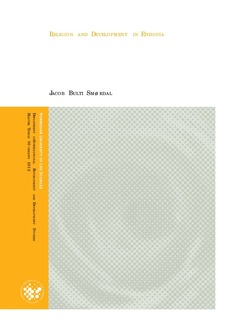| dc.contributor.author | Smørdal, Jacob Bulti | |
| dc.date.accessioned | 2012-09-19T11:00:59Z | |
| dc.date.available | 2012-09-19T11:00:59Z | |
| dc.date.copyright | 2012 | |
| dc.date.issued | 2012-09-19 | |
| dc.identifier.uri | http://hdl.handle.net/11250/187869 | |
| dc.description.abstract | Since the 1980s there has been a search for alternative approaches to development
that encompasses different variables of the social systems. The most recent evolution
of development thought has been characterized by a multidimensional approach to
development, also referred to as the human development approach. In this approach
attention is drawn towards the significance of ethics and values in development. The
recognition of development as a value-based process opens up to address the role of
religion in development processes. In this thesis I have explored the role of religion
within a value-based conception of development.
The geographical area of focus for this research is Ethiopia and the Norwegian
Church Aid (NCA) presence in this country. During my fieldwork I have, through
interviews and observation, gained understanding of how NCA understands the role
of religion in development in Ethiopia.
The thesis shows that in some areas of NCA’s development practice
collaboration with religious leaders and faith-based organizations (FBO) is especially
emphasized and regarded as essential to achieve certain development objectives. NCA
have involved religious leaders at both local and national level into their development
practice. Religious leaders influential mandated position and credibility, in local
communities and national institutions, is recognized as both potentially constructive
and obstructive to the process of development.
Examined cases, conducted interviews and observations in this thesis reveal an
instrumental approach to religion in NCA’s development practice. However, this does
not provide the full picture. NCA also appears to facilitate for a more informed
understanding of development that takes place at a conceptual level. Religious leaders
and FBO’s are encouraged and challenged into conceptualising processes where
religious norms and values are explored and examined in relation to development.
The outcome of these processes seems to pave the way for the emergence of new
values that better incorporates and acknowledges the existence and interest of both
religion and development. The role of religion in NCA’s development practice appears as a dynamic
dialogue between the sacred and the profane where religion is regarded as a natural
and almost an inevitably part of development. NCA’s objective seems to be focused
on finding common ground between religion and development in fighting poverty.
The analysis and discussion in this thesis shows that the role of religion in
development is not merely about how religion can inform the concept of
development, but also about how development can inform the concept of religion. | no_NO |
| dc.language.iso | eng | no_NO |
| dc.publisher | Norwegian University of Life Sciences, Ås | |
| dc.title | Religion and development in Ethiopia | no_NO |
| dc.type | Master thesis | no_NO |
| dc.subject.nsi | VDP::Social science: 200::Sociology: 220 | no_NO |
| dc.subject.nsi | VDP::Humanities: 000::The study of folklore, Ethnology: 100::Ethnology: 102 | no_NO |
| dc.source.pagenumber | 90 | no_NO |
